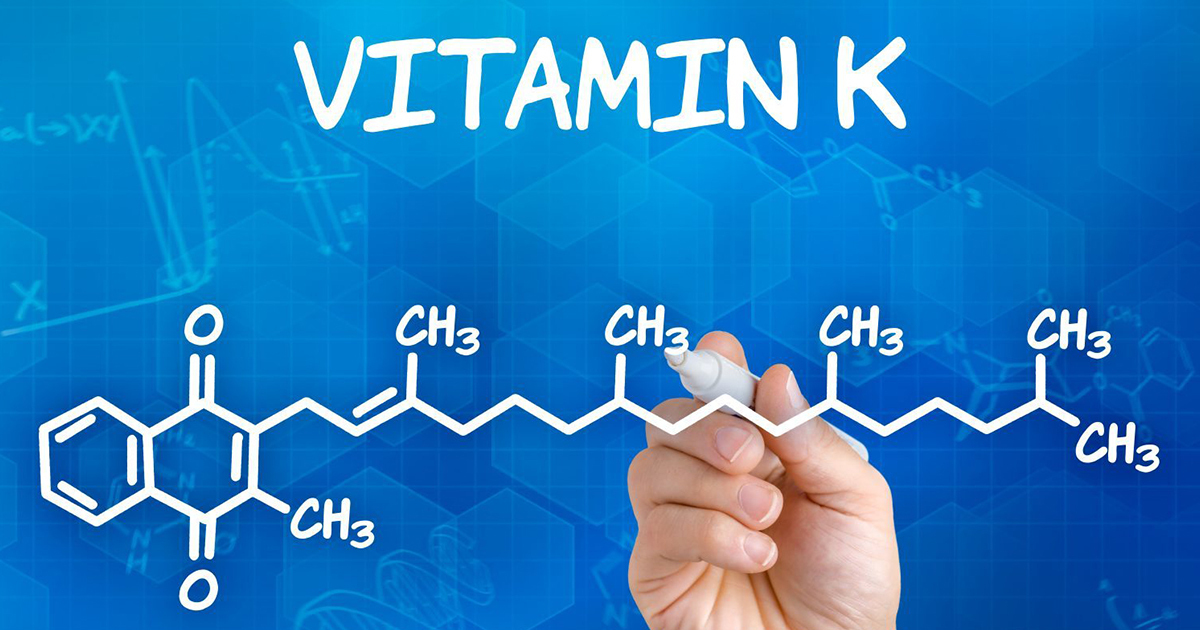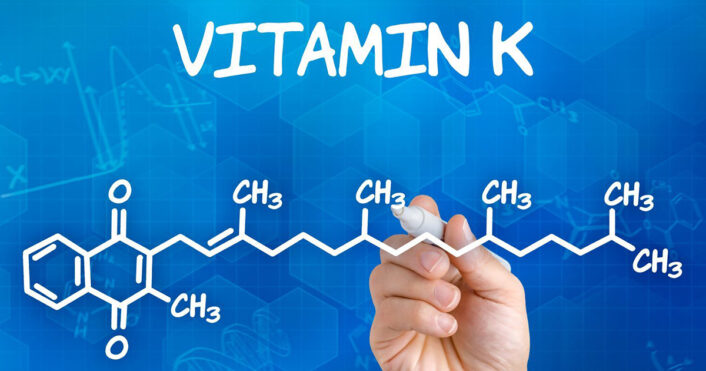Personalized Nutrition: How Your Genes Affect Vitamin K Levels
Aira
on
December 1, 2023

Latest Posts
Table of Contents
Personalized Nutrition: How Your Genes Affect Vitamin K Levels
Date of Content: November 7, 2023
Written by: Jess Gayo
Reviewed by: Maarit Tiirikainen, PhD
Overview
What is Vitamin K?
Ever heard your parents tell you to eat your fruits and veggies for more Vitamin K? If not, you’re not the only one. Vitamin K is not as popular among the necessary vitamins to get but it is no less important than Vitamins A, B, and C when it comes to keeping the body healthy.
Vitamin K is a fat-soluble vitamin that plays a crucial role in blood clotting, bone metabolism, and cardiovascular health. It exists in two primary forms: K1 (phylloquinone) and K2 (menaquinone). Phylloquinone is found in green leafy vegetables, while bacteria synthesize menaquinone in the human gut, and is also present in fermented foods.
The main function of vitamin K is to activate proteins involved in blood clotting, such as prothrombin. Without sufficient vitamin K, the blood clotting process would be impaired, leading to increased bleeding tendencies. Vitamin K also contributes to bone health by regulating calcium within the bones and arteries. It helps to prevent the calcification of arteries and soft tissues, reducing the risk of cardiovascular diseases.
Vitamin K deficiency is relatively rare, but it can occur in individuals with malabsorption issues, certain medical conditions, or those taking medications that interfere with vitamin K metabolism. Symptoms of deficiency include easy bruising, bleeding, and impaired bone health. In some cases, supplements may be recommended, particularly for individuals with specific health conditions or those taking medications that interfere with vitamin K absorption.

Where Can You Find Vitamin K?
There are many sources of Vitamin K. Vitamin K1, also known as phylloquinone, is abundant in green leafy vegetables such as kale, spinach, broccoli, and lettuce. These vegetables are potent sources that contribute significantly to daily vitamin K intake.
Vitamin K2, or menaquinone, is found in fermented foods like kefir and natto (fermented soybeans), cheeses, and certain other animal products. The human gut microbiota also synthesizes a portion of vitamin K2, enhancing overall availability.
To maintain optimal vitamin K levels, incorporating a diverse range of foods into the diet is crucial. As with any nutrient, balance is key, and consulting with a healthcare professional can help tailor dietary choices to individual needs, ensuring adequate vitamin K intake for blood clotting, bone health, and overall well-being.
What Can Affect Vitamin K Levels?
Diet, problems with absorption, interactions between medications, and gastrointestinal health can all affect vitamin K levels. Optimal vitamin K levels are supported by a diet high in fermented foods, green leafy vegetables, and sufficient gut flora. Functional Vitamin K deficits may result from some medicines that interfere with its activity, such as blood thinners.
Vitamin K absorption may be impacted by conditions that influence fat absorption, such as inflammatory bowel disorders or celiac disease. Maintaining healthy bones, appropriate blood coagulation, and general vitamin K-dependent bodily processes all depend on these variables.
Genetic Factors
The way a person gets this vital nutrient is influenced by genetic factors associated with vitamin K metabolism. Although this area of study is still developing, some genetic variants have been shown to affect the way the body metabolizes and uses vitamin K.
A more complete picture of the effects of individual genetic variants on vitamin K metabolism is likely to emerge as genetic research progresses. With the ability to customize interventions based on each person’s distinct genetic composition, this knowledge could advance precision medicine and lead to better health outcomes.
VKORC1 Gene
Vitamin K is crucial for bone health, and its processing depends on a gene called VKORC1. One study shows that those with a specific VKORC1 variation (9041 GG and GA) were more likely to have low bone density, suggesting a higher risk for them. The study indicates that a genetic difference in the VKORC1 gene may be associated with low bone density, possibly influencing osteoporosis.
GGCX Gene
Another significant genetic component is the GGCX gene, which encodes an enzyme that activates vitamin K-dependent proteins. Changes in GGCX, such as those associated with the SNP rs10187424, may have an impact on how well this activation mechanism works, which may have an impact on bone metabolism and blood coagulation.
CYP4F2 Gene
The CYP4F2 gene has been associated with vitamin K metabolism. This gene codes for an enzyme involved in the breakdown of vitamin K. Polymorphisms in CYP4F2 may influence how quickly the body clears vitamin K, impacting its availability for various biological functions.
Understanding one’s genetic predisposition can have implications for personalized nutrition and healthcare. Individuals with certain genetic variations may benefit from tailored dietary approaches, supplementation, or adjusted medication regimens to optimize their vitamin K status.
Environmental Factors
Genetic factors represent just one aspect of the complex interplay influencing active vitamin K levels. Environmental factors, overall health, and lifestyle choices also play significant roles.
Diet
Variety of Foods: A diverse diet rich in green leafy vegetables, such as kale, spinach, and broccoli, provides ample vitamin K1. Cheese, meat, and fermented foods like natto or sauerkraut contribute to vitamin K2. A balanced and varied diet helps ensure sufficient vitamin K intake.
Gut Health
Microbiota: The gut microbiota plays a crucial role in synthesizing vitamin K2. Individuals with imbalances in gut bacteria or those taking antibiotics that disrupt the microbiota may experience altered vitamin K metabolism.
Medications
Antibiotics: Certain antibiotics can affect the gut microbiota, potentially impacting vitamin K synthesis. Individuals on prolonged or frequent antibiotic courses may need to monitor their vitamin K levels.
Liver Function
Liver Diseases: Since the liver is crucial for synthesizing clotting factors dependent on vitamin K, liver diseases can affect vitamin K metabolism. Individuals with liver disorders may have altered vitamin K levels.
Age and Life Stage
Infants: Newborns may have lower vitamin K levels, as they are born with limited stores and their gut microbiota is still developing. Vitamin K supplementation is often recommended for newborns to prevent bleeding disorders.
Lifestyle Choices
Alcohol Consumption: Excessive alcohol intake can impact liver function, potentially affecting the synthesis of vitamin K-dependent proteins involved in blood clotting.
Weight Loss Surgeries
Bariatric Surgery: Procedures that involve the removal or bypass of parts of the gastrointestinal tract can lead to malabsorption of fat-soluble vitamins, including vitamin K.
Smoking
Tobacco Use: Some studies suggest that smoking may be associated with lower vitamin K levels. The exact mechanisms are not fully understood, but smoking-related oxidative stress could be a contributing factor.
Physical Activity
Exercise: Regular physical activity has been associated with improved vitamin K status. However, extreme exercise or training may increase the risk of vitamin K deficiency due to increased metabolic demands.
Understanding and addressing these environmental factors are crucial for maintaining optimal vitamin K levels. Individuals with specific health conditions, those taking medications, or those undergoing significant lifestyle changes should consult healthcare professionals to assess and manage their vitamin K status effectively. Regular monitoring and adjustments to dietary habits or supplementation may be recommended based on individual needs and circumstances.
Why is Vitamin K Given to Newborn Babies?
Vitamin K is routinely administered to newborn babies shortly after birth to prevent a rare but potentially serious condition known as Vitamin K Deficiency Bleeding (VKDB) or Hemorrhagic Disease of the Newborn (HDN). This practice has become a standard part of newborn care in many countries.
Newborns are born with limited stores of vitamin K, and their ability to produce it through their gut microbiota is not fully developed in the early days of life. Vitamin K is essential for the synthesis of clotting factors in the liver. Without sufficient vitamin K, newborns are at risk of bleeding disorders, which can lead to serious complications, including internal bleeding in the brain.
The most severe form of VKDB, known as early onset VKDB, can occur within the first 24 hours to the first week of life. Since newborns may not have enough vitamin K to prevent bleeding during this critical period, a single intramuscular vitamin K injection is commonly administered shortly after birth. In some cases, oral vitamin K may be given as an alternative.
This preventive measure has proven highly effective in reducing the incidence of VKDB and its associated complications. While VKDB is rare, the potential consequences underscore the importance of this routine administration of vitamin K, ensuring the newborn’s blood-clotting system is adequately supported during the vulnerable early days of life.
What Happens if You Have Vitamin K Deficiency?
Vitamin K deficiency can lead to impaired blood clotting, potentially resulting in excessive bleeding and bruising. Since vitamin K is essential for the synthesis of clotting factors in the liver, a deficiency can compromise the body’s ability to form blood clots effectively. This may manifest as easy bruising, prolonged bleeding from wounds, or, in severe cases, spontaneous bleeding.
Vitamin K is also involved in regulating calcium in the bones and arteries. A deficiency may contribute to abnormal calcium deposition in soft tissues, potentially impacting bone health and cardiovascular function. Individuals experiencing symptoms of vitamin K deficiency should seek medical attention for proper diagnosis and intervention.
What is the Suggested Daily Intake of Vitamin K?
The recommended daily intake of vitamin K can vary based on factors such as age, sex, and life stage. Generally, the Adequate Intake (AI) levels for vitamin K established by health authorities are as follows:
Infants
- 0 to 6 months: 2 micrograms (mcg) per day
- 7 to 12 months: 2.5 mcg per day
Children
- 1 to 3 years: 30 mcg per day
- 4 to 8 years: 55 mcg per day
- 9 to 13 years: 60 mcg per day
Adolescents and Adults
- Males 14 to 18 years: 75 mcg per day
- Females 14 to 18 years: 75 mcg per day
- Males 19 years and older: 120 mcg per day
- Females 19 years and older: 90 mcg per day
Pregnant and Breastfeeding Women
- Pregnant females 14 to 18 years: 75 mcg per day
- Pregnant females 19 years and older: 90 mcg per day
- Breastfeeding females 14 to 18 years: 75 mcg per day
- Breastfeeding females 19 years and older: 90 mcg per day
These recommendations are based on maintaining adequate blood clotting and bone health. It’s important to note that individual needs may vary, and factors such as medical conditions, medications, and diet can influence vitamin K requirements.
Individuals with specific health concerns should consult healthcare professionals for personalized guidance on meeting their vitamin K needs.
Ways to Maintain Vitamin K Levels
Maintaining adequate vitamin K levels is crucial for overall health, especially for proper blood clotting and bone metabolism.
Dietary Sources
- Green Leafy Vegetables: Incorporate kale, spinach, broccoli, Brussels sprouts, and other leafy greens into your diet. These vegetables are rich in vitamin K1, the primary form of vitamin K found in plant foods.
- Fermented Foods: Include fermented options like kefir, sauerkraut, and natto, as they provide vitamin K2, the form also synthesized by bacteria in the gut.
- Varied Nutrient Intake: Consume a well-balanced diet that includes a variety of foods to ensure you receive a spectrum of essential nutrients, including vitamin K. A diverse diet supports overall health and helps prevent deficiencies.
- Fat Absorption: Since vitamin K is fat-soluble, consuming healthy fats can aid in its absorption. Include sources of healthy fats such as olive oil, avocados, and nuts in your meals.
Supplements
- Probiotics: Support a healthy gut microbiome by including probiotic-rich foods or supplements. A balanced gut microbiota contributes to the synthesis of vitamin K2.
- Consultation with Healthcare Professionals: In cases where dietary intake may be insufficient or if there are concerns about absorption, healthcare professionals may recommend vitamin K supplements. However, self-prescription is not advisable, as excessive vitamin K supplementation can have adverse effects.
- Monitor Nutrient Levels: Include vitamin K levels in routine health checkups, especially if you have conditions affecting nutrient absorption or metabolism. Early detection of deficiencies allows for timely intervention.
Awareness of Medications
- Anticoagulants: If you are taking anticoagulant medications (blood thinners), work closely with your healthcare provider. These medications can interfere with vitamin K’s clotting function, and adjustments may be necessary to maintain a balance between preventing excessive clotting and avoiding bleeding issues.
Lifestyle Choices
- Avoid Excessive Alcohol: Excessive alcohol intake can impact liver function, potentially affecting the synthesis of vitamin K-dependent clotting factors. Moderation is key.
- Regular Exercise: Engage in regular physical activity, as it has been associated with improved vitamin K status. However, extreme exercise may increase the risk of deficiency due to higher metabolic demands.
Pregnancy and Infancy
- Supplementation for Newborns: Newborns are often given vitamin K supplements shortly after birth to prevent Vitamin K Deficiency Bleeding (VKDB).
By incorporating these strategies into your lifestyle, you can maintain optimal vitamin K levels, supporting essential physiological functions and promoting overall health. Always consult with healthcare professionals for personalized advice, especially if you have specific health concerns or conditions.
LifeDNA’s Vitamin K Report
Unlock the secrets of your health with LifeDNA’s Vitamin K Report – your personalized guide to optimizing Vitamin K levels for enhanced well-being! Our comprehensive report delves into your unique genetic makeup, providing insights into how your body processes and utilizes Vitamin K. Discover the factors that may impact your vitamin K levels and receive personalized recommendations to maintain an optimal balance.
LifeDNA’s cutting-edge technology analyzes your DNA to uncover valuable information about your vitamin K metabolism. Armed with this knowledge, you can make informed choices about your diet, lifestyle, and supplementation to support your body’s natural processes.
But that’s not all – explore our complete Vitamins Report for a holistic understanding of how your genetics influence your nutrient needs. And don’t miss out on other insightful reads such as our Glomerular Filtration Report and Vitamin A Report for additional health insights tailored just for you.
Avail of LifeDNA’s Vitamin K Report and unlock the power of personalized health recommendations. Visit our website to learn more and start your personalized wellness transformation. Take charge of your wellness journey today.
Summary
- Fat-soluble vitamin K is essential for healthy blood coagulation, bone metabolism, and cardiovascular function.
- Vitamin K comes in two main forms; K1 (phylloquinone) and K2 (menaquinone).. Green leafy vegetables contain phylloquinone, whereas menaquinone is produced by bacteria in the human stomach and can also be found in some foods.
- Although it is comparatively uncommon, vitamin K shortage can happen to people who have problems with malabsorption, have specific medical disorders, or are on medications that affect how well their bodies metabolize vitamin K.
- Eating a wide variety of food items is essential for maintaining healthy levels of vitamin K in the diet. Balance is important when it comes to nutrition, and speaking with a healthcare provider can help you customize your diet to meet your specific needs.
- One part of the intricate interactions affecting vitamin K levels is genetic but significant contributions are also played by lifestyle choices, general health, and environmental factors.
- A lack of vitamin K may affect blood clotting, which may cause excessive bleeding and bruises.
- For individualized advice, always seek the opinion of medical professionals, particularly if you have any particular health issues or diseases.
References
- https://www.hsph.harvard.edu/nutritionsource/vitamin-k/
- https://www.mountsinai.org/health-library/supplement/vitamin-k
- https://www.msdmanuals.com/home/disorders-of-nutrition/vitamins/vitamin-k-deficiency#:~:text=The%20main%20symptom%20of%20vitamin,stools%20may%20be%20tarry%20black.
- https://www.healthline.com/nutrition/foods-high-in-vitamin-k
- https://pubmed.ncbi.nlm.nih.gov/18374188/
- https://www.sciencedirect.com/topics/biochemistry-genetics-and-molecular-biology/gamma-glutamyl-carboxylase#:~:text=in%20Pharmacogenomics%2C%202013-,GGCX,candidate%20for%20affecting%20warfarin%20pharmacodynamics.
- https://www.sciencedirect.com/science/article/pii/S0002916523048475?via%3Dihub
- https://bmcmedgenet.biomedcentral.com/articles/10.1186/1471-2350-8-S1-S11
- https://www.sciencedirect.com/science/article/abs/pii/S0031938423001774#:~:text=The%20diversity%20of%20the%20gut,family%20of%20bacteria%20%5B11%5D.
- https://www.ncbi.nlm.nih.gov/pmc/articles/PMC6385738/
- https://www.cdc.gov/ncbddd/vitamink/faqs.html#:~:text=Low%20levels%20of%20vitamin%20K%20can%20lead%20to%20dangerous%20bleeding,asked%20questions%20and%20their%20answers.
- https://www.healthdirect.gov.au/vitamin-k-deficiency#:~:text=and%20vitamin%20K.-,What%20are%20the%20symptoms%20of%20vitamin%20K%20deficiency%3F,also%20make%20your%20periods%20heavier.
- https://www.healthdirect.gov.au/vitamin-k-deficiency#:~:text=and%20vitamin%20K.-,What%20are%20the%20symptoms%20of%20vitamin%20K%20deficiency%3F,also%20make%20your%20periods%20heavier.
- https://ods.od.nih.gov/factsheets/VitaminK-Consumer/
- https://www.webmd.com/vitamins-and-supplements/ss/slideshow-ways-to-get-vitamin-k
- https://www.ihtc.org/warfarin-and-vitamin-k#:~:text=How%20Does%20Warfarin%20Interact%20with,the%20action%20of%20this%20medication.
Customer Reviews




*Understanding your genetics can offer valuable insights into your well-being, but it is not deterministic. Your traits can be influenced by the complex interplay involving nature, lifestyle, family history, and others.
Our reports have not been evaluated by the Food and Drug Administration. The contents on our website and our reports are for informational purposes only, and are not intended to diagnose any medical condition, replace the advice of a healthcare professional, or provide any medical advice, diagnosis, or treatment. Consult with a healthcare professional before making any major lifestyle changes or if you have any other concerns about your results. The testimonials featured may have used more than one LifeDNA or LifeDNA vendors’ product or reports.
- Category: Immunity & Vitamins



